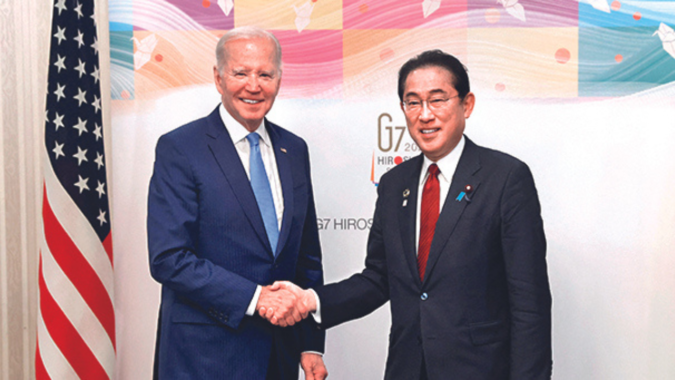HIROSHIMA: US President Joe Biden and Japan’s Fumio Kishida met for talks in the deeply symbolic city of Hiroshima on Thursday, aiming for closer cooperation in the face of an ascendant China and an unpredictable Russia they see as threatening the post-war order. The two met ahead of a three-day Group of Seven (G7) summit that starts on Friday in Hiroshima, the first city to be levelled by an atomic bomb.
Members of the G7, which also includes Germany, the UK, France, Italy and Canada, are increasingly concerned by what they see as China’s economically coercive policies and its rapid accumulation of sensitive technology – as well as Russia’s repeated threats over use of nuclear arms.
But tackling those issues head-on isn’t so easy, officials from G7 members have said in private, particularly given the West’s immense reliance on China, the world’s second-largest economy, as both a trade partner and in some cases a manufacturing base. “The international community is at a crossroads in history,” PM Kishida told a briefing following his over an hour-long meeting with Biden. The summit would be a chance for G7 members to show the world their commitment to “a free and open international order based on the rule of law”, Kishida said, language that appeared to be aimed at both Russia and China. Japan, although a longtime buyer of Russian oil, has moved in tandem with G7 sanctions against Moscow following Russia’s February 2022 invasion of Ukraine. That military action has also raised fears among Japanese that China could be emboldened to take action against neighbouring, self-ruled Taiwan unless Russia is stopped.
The G7 will aim to tighten sanctions on Russia to prevent it skirting measures already in place, Germany’s leader, Olaf Scholz, said on Thursday. The US will have a package of sanctions associated with a G7 statement that will centre on such an issue of enforcement of Russian sanctions, US National Security Adviser Jake Sullivan said. Kishida later said he and Biden had agreed to continue “strict sanctions against Russia as well strong support for Ukraine”.
Members of the G7, which also includes Germany, the UK, France, Italy and Canada, are increasingly concerned by what they see as China’s economically coercive policies and its rapid accumulation of sensitive technology – as well as Russia’s repeated threats over use of nuclear arms.
But tackling those issues head-on isn’t so easy, officials from G7 members have said in private, particularly given the West’s immense reliance on China, the world’s second-largest economy, as both a trade partner and in some cases a manufacturing base. “The international community is at a crossroads in history,” PM Kishida told a briefing following his over an hour-long meeting with Biden. The summit would be a chance for G7 members to show the world their commitment to “a free and open international order based on the rule of law”, Kishida said, language that appeared to be aimed at both Russia and China. Japan, although a longtime buyer of Russian oil, has moved in tandem with G7 sanctions against Moscow following Russia’s February 2022 invasion of Ukraine. That military action has also raised fears among Japanese that China could be emboldened to take action against neighbouring, self-ruled Taiwan unless Russia is stopped.
The G7 will aim to tighten sanctions on Russia to prevent it skirting measures already in place, Germany’s leader, Olaf Scholz, said on Thursday. The US will have a package of sanctions associated with a G7 statement that will centre on such an issue of enforcement of Russian sanctions, US National Security Adviser Jake Sullivan said. Kishida later said he and Biden had agreed to continue “strict sanctions against Russia as well strong support for Ukraine”.
